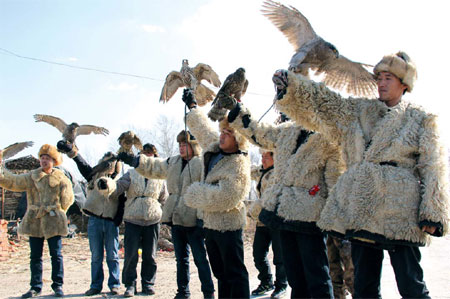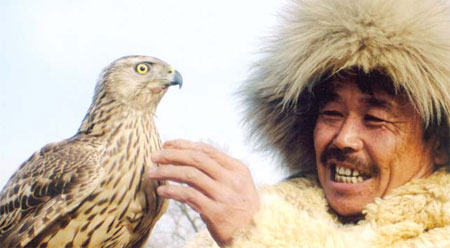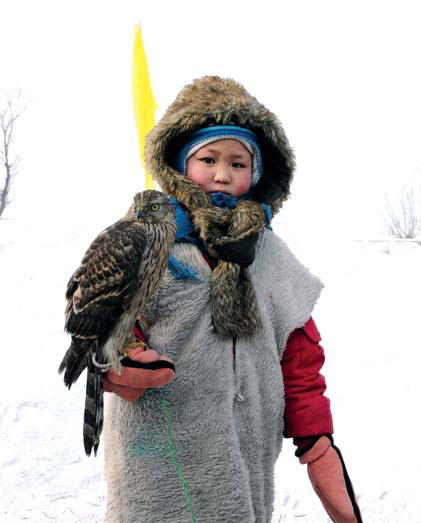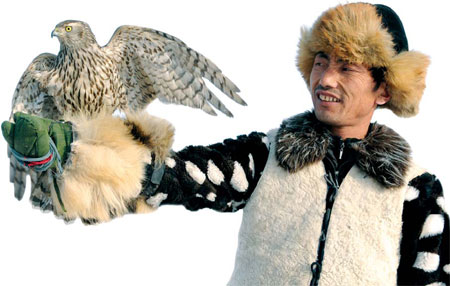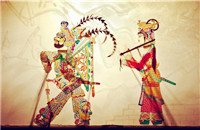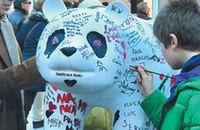Man has lifelong love for deadly bird
|
An effort to protect the country's intangible cultural heritage, the traditional Manchu ceremony for releasing trained hunting falcons into the wild was held in the Changbai Mountains on April 9. Provided by Cao Baoming |
|
Known as the 'King of Falcons', Zhao Mingzhe of Yulou village has a reputation locally as the most famous falcon hunter and trainer. Provided by Cao Baoming |
Every year when October comes around, Zhao Mingzhe gets anxious.
He wakes up in the middle of the night and paces around his front door smoking as he awaits the midnight arrival of the first frost of autumn.
This is the time when the animals come out of the mountains in search of food, bringing with them the object of Zhao's lifelong fascination: falcons.
Many might find falcons to be dangerous, fearsome predators, but Zhao cherishes these creatures he has spent most of his life with.
Zhao and his family live in Yulou village along the foot of Changbai Mountains, Jilin province. Here, training falcons is a tradition dating back to ancient China's Qing dynasty (1644-1911). The village was designated as a place to catch and train falcons, which is how it became known as "falcon village".
For hundreds of years, becoming an established falcon trainer has been the dream of every man in the village. The falcons are caught and trained to aid in hunting before winter comes. For village men, training falcons is a right of passage into manhood.
Zhao Mingzhe is known in the village as the best.
Catching and training falcons has become an indispensable part of his life, and his connection to this tradition dates back generations.
Zhao Yinglu, Zhao's grandfather, started dealing with falcons at the age of 7. The well-educated man did most of his reading among a crowd of falcons. The image of the elder Zhao holding a book in his left hand while letting a falcon perch on his right arm was a familiar sight to villagers in his time.
Zhao Mingzhe's work with the falcons also began at a very young age. Trainers must spend day and night with the falcons to develop a close bond.
But as a young man, he was very much afraid of the fierce animal.
"My father always used fried cakes to bribe me into staying with the animal," he says. "Fried cakes were the best snack for kids at that time, and I could not say no to it."
Few kids would be willing to spend their childhood with an animal that could potentially hurt them. But, during the terrifying process, Zhao learned about the falcon's smells, communicating via eye contact and its habits.
By the time he was a teenager, Zhao was already an established falcon catcher and trainer.
The process of catching the falcons is itself deadly dangerous and requires patience and skill. Falcon catchers usually look for younger falcons, which are easier to train. This requires them to wait in nearby bushes until the adults leave their young behind to hunt.
But, if the parents return before the young falcon is captured, the falcon catchers will find themselves face to face with a full-grown falcon ready to defend its offspring to the death.
In autumn and winter, falcon catchers come back bearing not only falcons in cages but also the coffins of those who died catching them. Each falcon that is caught usually comes at the expense of a human life.
Zhao has had his share of close calls throughout his many years in this line of business.
"People usually think that it's the falcons that may take your life away," Zhao says. "Yet in fact, in the vast, open field, you have no idea what may cause death."
Zhao vividly remembers a hot autumn day during the early years of his career when he almost died.
He went into the mountains early in the morning, and sat in the grass as usual to wait for the falcons to appear. Suddenly, he felt something moving beneath the grass, and sensing danger, he got up and ran. On his heels was a huge snake.
Not only is catching falcons a dangerous task, training them requires courage, patience and a large amount of time.
"When you bring such a fierce animal home, the first step is to starve them," Zhao said. "This makes them obedient, and then they will easily listen to the trainers."
Zhao says that when the falcons are first brought back, they are extremely agitated, and do not eat anything. This initially makes them starve and grow fierce.
"This is the stage in which we should start communicating with the falcons," Zhao says. "You should walk him from time to time, and start training them at a very basic stage."
The starvation stage makes the falcons submissive to humans. Zhao then trains them to jump on his arm, and rewards the falcon with a piece of meat.
"This is pretty much like training other animals," Zhao says. "But when he is agitated and starving, you need to show him you care for him and pet him with your hand."
Zhao has been treating every falcon like his own child and spending most of his time with them.
However, after the falcons are trained and have helped Zhao with a season of animal hunting, Zhao returns them to nature - a custom for Manchu falcon catchers.
"They belong to nature, after all," Zhao says, "They also need to have their families and breed their children all like us. I understand this."
But he is always very reluctant to let them go.
When Zhao is preparing to set his falcons free, he again goes without sleep and gets up in the middle of the night to meet his falcons.
The falcons, after training with Zhao for several months, look back at Zhao as if they too are unwilling to leave.
"But when another autumn comes, I will again sit at my front porch waiting for the coming of falcons," Zhao says "That's how my life goes around."
Cao Baoming contributed to the story.
liumingtai@chinadaily.com.cn
|
A village boy works with a falcon. Children in Yulou begin training falcons at a young age. Provided by Zhou Changqing |
|
A falcon perches on his trainer's arm. Provided by Zhou Changqing |
(China Daily 04/20/2012 page7)




